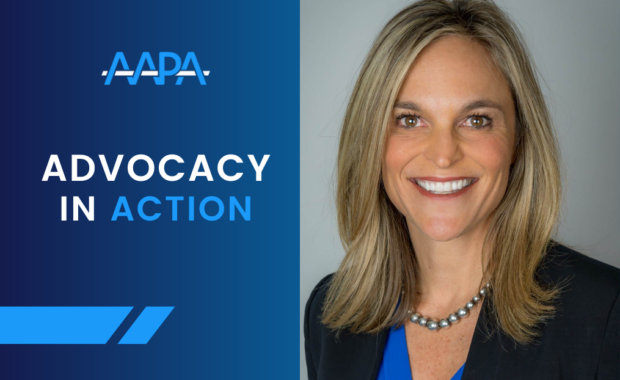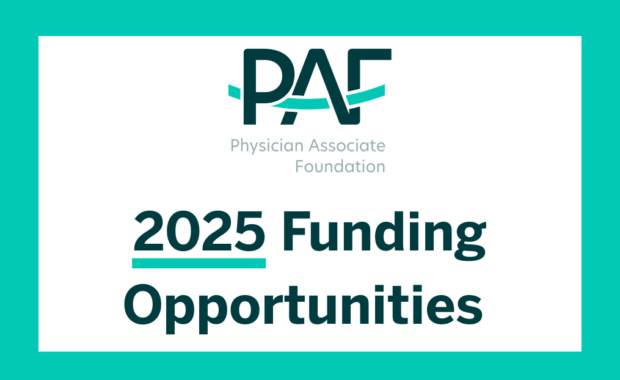PAs Influential in Fight Against Flu
Talk to Older Patients About Getting Vaccine
December 5, 2017
By Eileen Denne
PAs can be influential in convincing adult patients, particularly those ages 65 and above, to get a flu vaccine. With the CDC naming Dec. 3-9, 2017, as National Influenza Vaccination Week, it is timely and important to talk to patients about the dangers of flu and strategies for prevention.
Older adults have an increased susceptibility to common infectious diseases due to the deterioration of the immune system and the likelihood of chronic age-related conditions. The CDC estimates that between 71 and 85 percent of seasonal flu-related deaths have occurred in people 65 years and older and more than half of seasonal flu-related hospitalizations occur among patients 65 and over.
Safe and effective flu vaccines specifically for this age group are available for the 2017-2018 flu season. They include an adjuvanted flu vaccine and a higher-dose flu vaccine, according to the CDC, which shares fact sheets and other information on its website.
PAs should remember that flu prevention for older adults includes having frank conversations with patients and reminding them that they can get their vaccination during an office visit with their healthcare provider or in other convenient locations such as local pharmacies. The PA Foundation is actively encouraging senior flu vaccination through the Be FLUent campaign, a collaborative initiative that provides information and tools to help protect older patients from the flu. Resources designed to help PAs and other healthcare providers proactively discuss the importance of flu protection specifically with their patients 65 and older are available on the PA Foundation website, including fact sheets, a patient conversation guide, and even a downloadable vaccination reminder card for patients.
In connection with the campaign, the Foundation released a new Vital Minds podcast episode on older adult flu protection. Guest expert Don Solimini, PA-C, MHA, DFAAPA, Director of Academic Education at Mary Baldwin University’s Murphy Deming College of Health Science, addresses flu dangers and prevention strategies in the podcast episode and shares his insights here.
1) How can PAs help increase the number of older adults who get the flu vaccine?
PAs can help increase the number of older adults who get the flu vaccine through more education and health literacy. PAs need to convey that these vaccines will enhance older adults’ quality of life, especially in cases where they have other comorbid diseases such as diabetes, COPD, or CAD. Basically, any disease where their immune system is already taxed will put them at added risk for severe complications, hospitalization, and death from flu.
2) Are there any unique approaches that you think are helpful when talking with older adults about vaccinations?
Guilt? Seriously, it is important to help them understand that getting the vaccine protects them. But even more importantly, getting a flu vaccine helps to protect those around them like their grandchildren, those who live with them in their community, their neighbors and friends.
3) What can be done to stem the tide of older adult hospitalizations and deaths from influenza?
One of the best things to do is to find avenues for education within the healthcare systems where we [PAs] work. We can meet with established community groups or at assisted living locations where more and more seniors live to hold brief education sessions on the need for vaccines. A lot of it is just asking these organizations. They are usually more than happy to have us talk to their group.
4) Is there any other advice you can give about providing flu vaccines to older adults?
We can remember that older adults can be the vector for some of the worst childhood diseases. Vaccines are the biggest reason for increased life expectancy since clean water! Including those chronic diseases mentioned above, anyone who needs to be taking a disease-modifying antirheumatic drug is also at increased risk of serious infection and needs immunization.
AAPA also has resources about the 2017-2018 flu season in Learning Central Conference on Demand.
Eileen Denne is director of corporate communications at AAPA. Contact her at [email protected].
Thank you for reading AAPA’s News Central
You have 2 articles left this month. Create a free account to read more stories, or become a member for more access to exclusive benefits! Already have an account? Log in.



